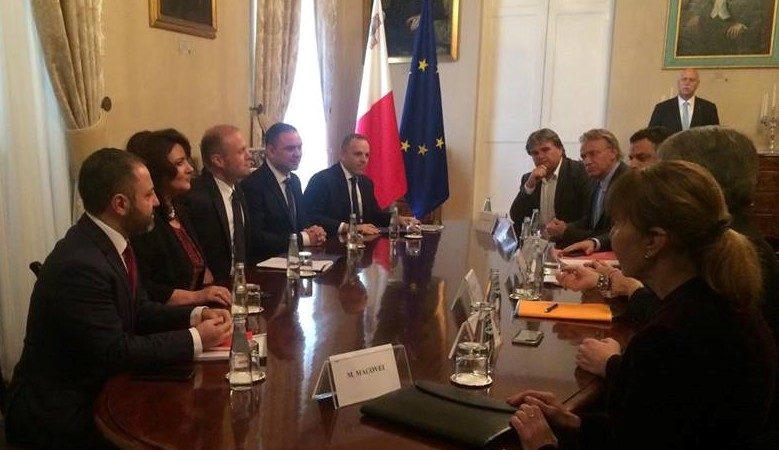The main conclusion of a European Parliament report by a delegation of MEPs chaired by Socialist Ana Gomes was predictable. Sacking Minister Konrad Mizzi and the Prime Minister’s Chief of Staff Keith Schembri was simply the right thing to do from the very moment it emerged that they owned secret companies in Panama. The fact that the PM absolved them twice, first by retaining them in office in 2016 and then by reconfirming them after his landslide victory last year was a complete rebuke of what is expected in countries where the rule of law is cherished.
Persistence in error
One suspects that the PM’s tactic is to let people get tired of hearing the obvious and move on. The Maltese audience has been hearing calls for their resignation for over a year. Probably the majority, including a number of Labour voters, agree with these calls. But for many, Panama has become yesterday’s news. Therefore the PM’s ‘persistence in error’ strategy, may work nationally.
Yet the PM now finds himself in a quandary. Can he continue to defend the indefensible before a European audience, whose scepticism on the Maltese way of doing things has drastically increased after the murder of journalist Daphne Caruana Galizia? After watching Roberto Saviano on Rai 3 yesterday, the PM should have started worrying that the perception of Malta as a banana republic is taking ground among Europeans.
He will ignore this at his own peril. For Muscat ’s worst nightmare is that of being perceived as a pariah in European circles. To save his own international standing, and with it the country’s, Muscat needs to act fast. He knows that the argument made by MEPs is rock solid.
“Persons perceived to be implicated in serious acts of corruption and money laundering, as a result of Panama Papers revelations and FIAU reports, should not be kept in public office and must be swiftly and formally investigated and brought to justice. Keeping them in office affects the credibility of the government, fuels the perception of impunity and may result in further damage to State interests by enabling the continuation of criminal activity.”
The PM’s reply to MPs that he had “decided on his own authority to retain these persons” suggests that the PM is investing in himself the power of supreme judge ignoring the basic rule of political responsibility.
By saying this after pointing out that “there had been elections in June, with clear results for the ruling Labour Party” and “there were judicial inquiries ongoing focusing on specific allegations,” the PM is deliberately confusing the issues. Logically, one would have expected Mizzi and Schembri to have resigned before facing investigations which in this case where triggered by reports by the former Opposition Leader and not by the police or the Attorney General.
A blueprint for reform
On other counts the report also states the obvious with regards to the need of institutional reforms ignored for decades by successive Nationalist and Labour governments which have led to an opaque division of powers. It was past inaction on the reform front which ultimately led to the institutional paralysis and the absence of any action against Schembri and Mizzi.
The recommendations found in the report go a long way in addressing these institutional failures. In this way rather than acting against Malta’s interests as alleged by sycophants on social media, the MEPs are standing for our rights as Europeans.
They proposed that the Police Commissioner should no longer be appointed by the Prime Minister but by an appropriate independent body. They call for stronger checks and balances in the Maltese legislative framework to limit possible interference of the Prime Minister in the judiciary and the media and for a reform of the Attorney General functions, to decouple the role of advisory to the government from the role of prosecution.
The Ferris test case
One major challenge facing government is whether it will grant whistleblower status to ex FIAU investigator Jonathan Ferris.
The Prime Minister responded that since Mr Ferris filed for protection as whistleblower, “protection would be offered in accordance with the law.” The fact that the status needs approval of the same Attorney General who chairs the FIAU, further exposes the institutional mess in Malta.
The MEPs have called on the government to give serious consideration for his “application for protection under the Whistleblower Protection Act.” For the first time, the government will be considering an application by someone who potentially has damaging information on members of government.
While it is easy to apply the law in cases exposing the corruption in previous governments, the real test for the Whistleblower Protection Act is when this is used to expose corruption under the government in office.












